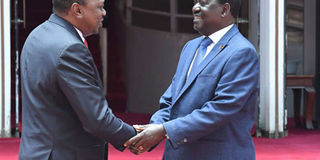It’s the season of handshakes: In praise of the ‘Kenyan disease’

President Uhuru Kenyatta and opposition chief Raila Odinga at Harambee House on March 9, 2018. FILE PHOTO | NATION MEDIA GROUP
What you need to know:
- In between, the warring parties in long-suffering South Sudan finally met face to face for the first time in two years.
- Salva Kiir and Dr Riek Machar would have hugged and kissed at a national prayer in 2014.
It is the season of political handshakes on the eastern side of Africa.
It all started on March 9, when President Uhuru Kenyatta and opposition chief Raila Odinga surprised many — and deeply disappointed some — when they shook hands after a memorably bitter election last year.
The comments about supporters of the ruling Jubilee Party and the opposition coalition Nasa being left high and dry, and accusations of world-class opportunism on Raila’s part, could fill a lake.
Then even bigger handshakes followed in Ethiopia after the youthful and reformist Abiy Ahmed was elected prime minister by the ruling EPRDF following the shock resignation of Hailemariam Desalegn.
Abiy has gone on to dizzy Ethiopia, and the world, with the speed and zeal of his reforms. After decades in which the opponents were tortured, beaten and arrested in droves, Abiy threw away that book. He released political prisoners and then shook hands with and ate injera with the opposition.
PARTIAL PRIVATISATION
He announced plans for the partial privatisation of the ultimate crown jewel, Ethiopian Airlines. He also offered two other sacred cows — the banking and telecoms sector — for privatisation and ended the blockage of hundreds of websites and international TV channels.
The interest from the rest of the world was so huge that government websites crashed.
Then a few weeks ago, he made one of his boldest moves — not only announcing that Ethiopia was ending its long, and once very bloody, border dispute with Eritrea but that it would restore economic relations with its neighbour.
At the weekend, Abiy went to the lion’s den: He flew across the border to Asmara and hugged the Eritrean strongman Isaias Afwerki. There were emotional scenes all over the place.
In between, the warring parties in long-suffering South Sudan finally met face to face for the first time in two years. President Salva Kiir and opposition leader Riek Machar met in Addis Ababa to try to end a savage conflict that has since late 2013 killed more than 300,000 people and sent nearly three million, 20 per cent of the population, fleeing to neighbouring countries.
They then met again a few days later in Khartoum. And a few days ago in Kampala.
AMORAL PRAGMATISM
On the face of it, these events are not connected to the Uhuru-Raila handshake. But they are. It is understandable that Kenyans hate how their politicians do business. The opportunism, about-turns and double dealing can drive the strongest men and women crazy.
But outsiders see in this a helpful amoral pragmatism. It means Kenyan politics is not as brittle as elsewhere.
There is no electoral alliance that is inconceivable. There is no political deal that can’t be cut. After the ugly electoral contest, the cheating and violence, opponents will still break bread at some point.
If South Sudan had the same ‘political opportunism’, hundreds of thousands of lives would have been saved. Kiir and Dr Machar would have hugged and kissed at a national prayer in 2014.
Without Kenyanesque political pragmatism, Abiy would not have canoodled with Afwerki in Asmara last week.
POLITICAL OPPORTUNISM
Even when it’s discussed with contempt as a shocking lack of principle, this Kenyan political opportunism does act as a powerful example in conversation.
In all probability, when Kiir and Dr Machar were being persuaded to end the madness in South Sudan, they were told things like, “Look at the Kenyans. Uhuru and Raila fought a bitter election.
There was violence, people were killed. But look; they shook hands and temperatures came down. If they can, why not you?”
In Uganda, since 2001, President Yoweri Museveni and his long-time archrival, Dr Kizza Besigye, have not met formally to discuss how to bring the country together. That’s 17 years.
At the height of a past Uganda post-election insanity, a Museveni minister called me early one morning.
He remarked: “Those Kenyan politicians of yours, they seem to have no religion or principle, but they are far better than us in one respect — they always find a point during crisis to walk away from the gates of Hell.”
POLITICAL DEAL
“Yes, they do,” I replied.
“How do they manage it? What is their secret?”
I offered my two cents worth. The point is that in the region, and around the continent, Kenya’s political ‘flexibility’ has created a cloud of what one might call “noble political opportunism” that makes the point that no political deal is impossible.
The ‘Handshake’ was mocked by jaded Kenyans but, on Twitter, other Africans saw it as an act of statesmanship. I suspect if you go the South Sudanese refugee camps they will tell you they looked on it with envy.
Mr Onyango-Obbo is the publisher of Africapedia.com and explainer site Roguechiefs.com. Twitter:





